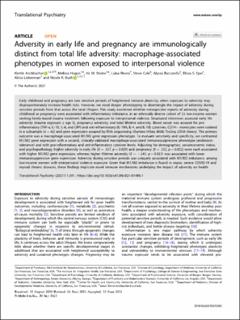| dc.description.abstract | Early childhood and pregnancy are two sensitive periods of heightened immune plasticity, when exposure to adversity may disproportionately increase health risks. However, we need deeper phenotyping to disentangle the impact of adversity during sensitive periods from that across the total lifespan. This study examined whether retrospective reports of adversity during childhood or pregnancy were associated with inflammatory imbalance, in an ethnically diverse cohort of 53 low-income women seeking family-based trauma treatment following exposure to interpersonal violence. Structured interviews assessed early life adversity (trauma exposure ≤ age 5), pregnancy adversity, and total lifetime adversity. Blood serum was assayed for pro-inflammatory (TNF-a, IL-1ß, IL-6, and CRP) and anti-inflammatory (IL-1RA, IL-4, and IL-10) cytokines. CD14+ monocytes were isolated in a subsample (n = 42) and gene expression assayed by RNA sequencing (Illumina HiSeq 4000; TruSeq cDNA library). The primary outcome was a macrophage-associated M1/M2 gene expression phenotype. To evaluate sensitivity and specificity, we contrasted M1/M2 gene expression with a second, clinically-validated macrophage-associated immunosuppressive phenotype (endotoxin tolerance) and with pro-inflammatory and anti-inflammatory cytokine levels. Adjusting for demographics, socioeconomic status, and psychopathology, higher adversity in early life (ß = .337, p = 0.029) and pregnancy (ß = .332, p = 0.032) were each associated with higher M1/M2 gene expression, whereas higher lifetime adversity (ß = −.341, p = 0.031) was associated with lower immunosuppressive gene expression. Adversity during sensitive periods was uniquely associated with M1/M2 imbalance, among low-income women with interpersonal violence exposure. Given that M1/M2 imbalance is found in sepsis, severe COVID-19 and myriad chronic diseases, these findings implicate novel immune mechanisms underlying the impact of adversity on health. | en_US |

